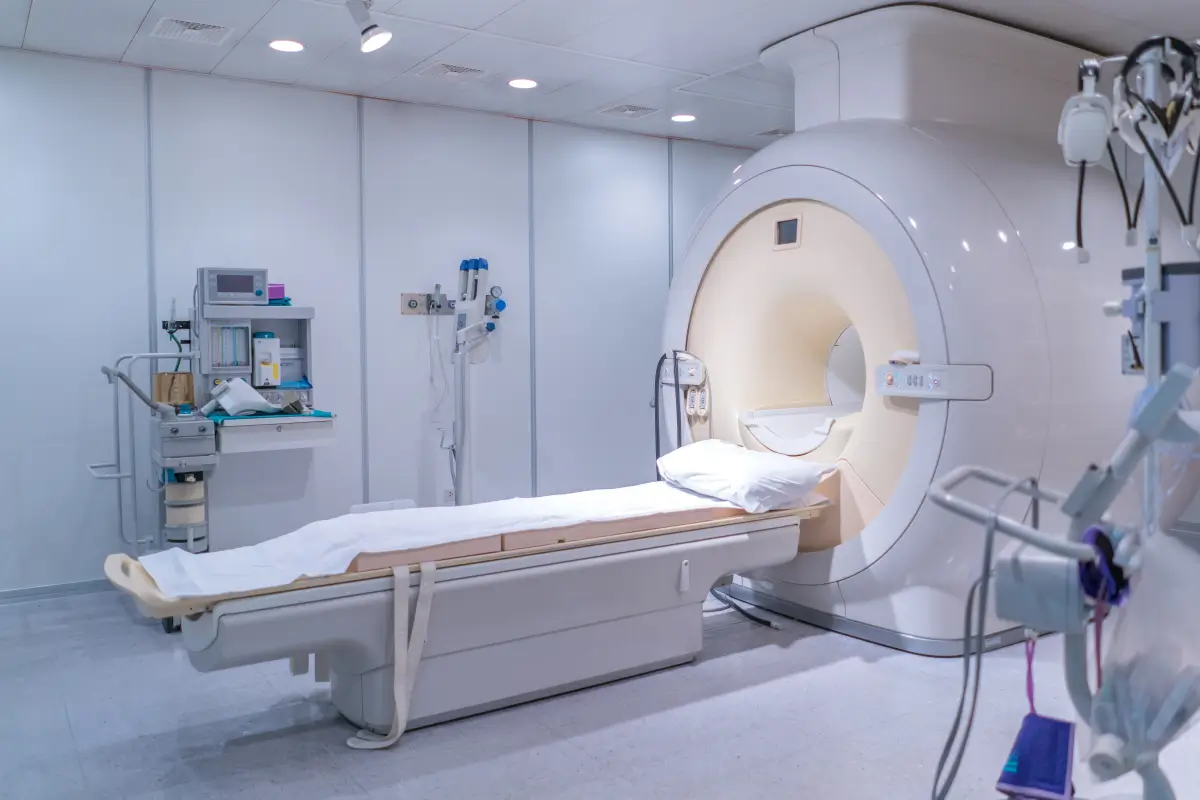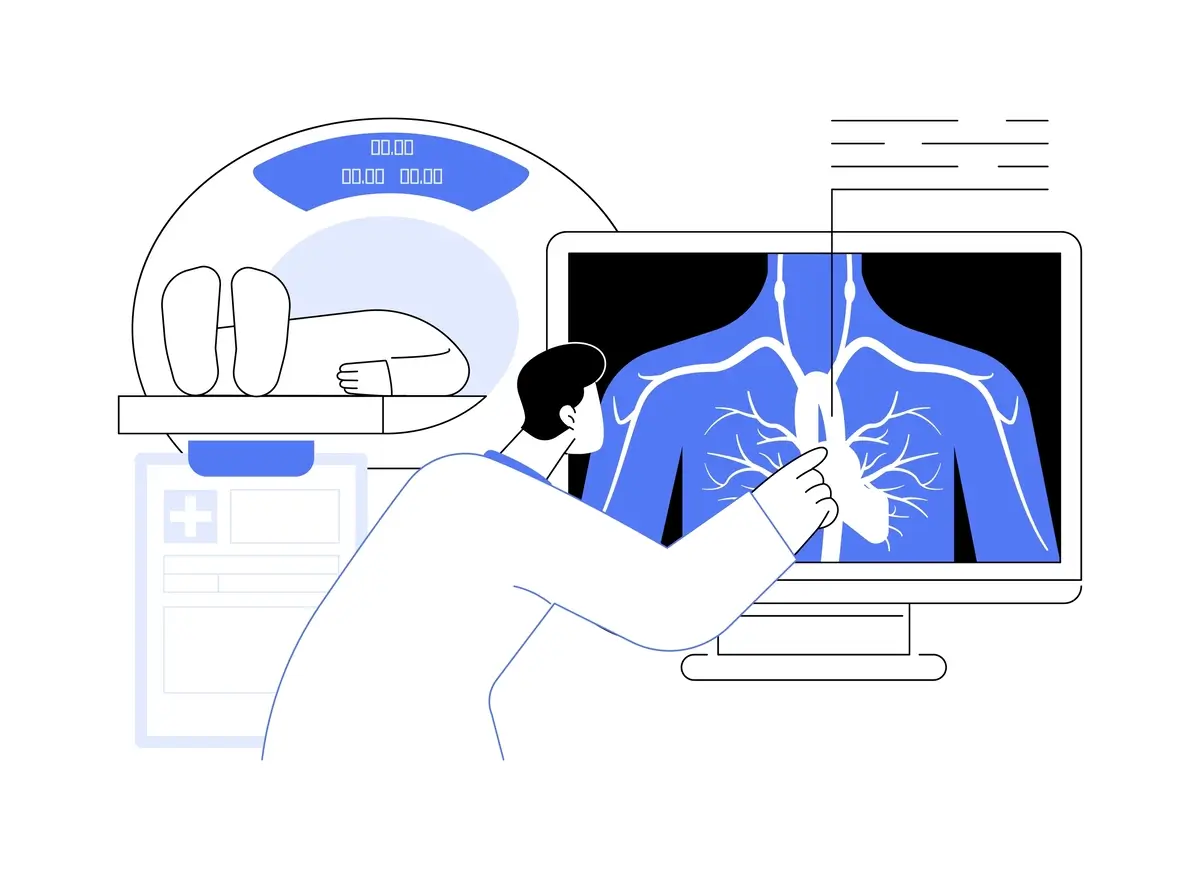Cardiac MRI: A Comprehensive Guide to Advanced Heart Imaging


Introduction
Cardiac Magnetic Resonance Imaging (Cardiac MRI or CMR) is one of the most advanced, non-invasive imaging techniques available in modern cardiology. It provides high-resolution, 3D images of the heart, allowing doctors to assess its structure, function, and tissue characteristics in great detail. As cardiac diseases become increasingly complex, accurate and early diagnosis is essential. Cardiac MRI offers a safe and highly informative tool for diagnosing, monitoring, and guiding treatment for a wide range of heart conditions.
At Harley Street Heart & Vascular Centre, we utilise cutting-edge cardiac MRI technology to provide personalised and precise cardiac care. This guide explores everything you need to know about cardiac MRI, from how it works and what it can detect to its benefits, preparation, and role in treatment planning.
What is a Cardiac MRI?
Cardiac MRI is a specialised form of magnetic resonance imaging used to capture detailed pictures of the heart and blood vessels. It uses powerful magnets, radio waves, and computer technology to create cross-sectional and 3D images without using ionising radiation, unlike X-rays or CT scans.
This advanced technique allows cardiologists to evaluate:
- The size and shape of the heart chambers
- Thickness and movement of the heart walls
- Function of the heart valves
- Blood flows through the heart and the great vessels
- Scarring, inflammation, or tissue damage
Cardiac MRI is especially useful in cases where 2D echocardiography or other cardiac tests are inconclusive.
How Cardiac MRI Works
Cardiac MRI machines use a strong magnetic field and radiofrequency pulses to realign hydrogen atoms in the body. When these atoms return to their normal state, they emit signals that are captured by the MRI scanner. These signals are then translated into highly detailed images by a computer.
In most cardiac MRI scans, a contrast agent called gadolinium is used to enhance image clarity and provide information about tissue perfusion and scarring.
To ensure accuracy, cardiac MRI is often synchronised with the patient’s heartbeat using ECG leads and with breathing patterns using breath-hold commands or respiratory gating.
Why is Cardiac MRI Performed?
Cardiac MRI is a versatile tool used in diagnosing, evaluating, and monitoring a wide variety of heart conditions. It offers a more detailed and comprehensive view of the heart than many other imaging modalities.
Common Indications for Cardiac MRI:
- Cardiomyopathies (e.g., hypertrophic, dilated, or restrictive)
- Coronary artery disease and myocardial infarction
- Heart valve disorders
- Congenital heart disease
- Pericardial disease (e.g., constrictive pericarditis)
- Cardiac tumours or masses
- Aortic disease (e.g., aneurysms or dissections)
- Cardiac sarcoidosis or cardiac amyloidosis
Myocarditis or post-viral inflammatory heart disease
Benefits of Cardiac MRI


Understanding the advantages of cardiac MRI can help patients feel more comfortable and informed about their diagnostic process.
Key Benefits:
- Radiation-free: Unlike CT scans, MRI does not use ionising radiation.
- Non-invasive: No surgery or internal device placement is required.
- High accuracy: Exceptional tissue characterisation and quantification.
- Comprehensive: Provides a holistic view of cardiac structure and function.
- Reproducible: Useful for tracking disease progression over time.
Preparing for a Cardiac MRI
Being well-prepared for your cardiac MRI ensures a smooth, accurate, and stress-free experience. The procedure is painless and usually takes between 30 and 90 minutes.
Before the Scan:
- Inform your doctor if you have any metal implants, pacemakers, or defibrillators.
- Mention any history of kidney disease or allergies to contrast agents.
- Avoid caffeine or large meals before the exam if advised.
On the Day:
- Wear loose, comfortable clothing with no metal components.
- You may be asked to change into a hospital gown.
- Remove all jewellery, watches, and metal objects.
At The Harley Street Heart & Vascular Centre, our medical staff will provide personalised instructions and guide you through every step of the MRI process.
What to Expect During a Cardiac MRI
Understanding the process can ease anxiety and help you prepare mentally.
During the Procedure:
- You will lie on a motorised table that slides into the MRI scanner.
- ECG electrodes will be attached to your chest to monitor heart rhythms.
- A contrast dye may be injected into your vein for certain imaging sequences.
- You will be asked to remain still and hold your breath periodically.
- The machine may make loud tapping or thumping noises—earplugs or headphones are provided.
A cardiac MRI typically lasts 60-90 minutes.
Types of Cardiac MRI Sequences
Cardiac MRI is made up of multiple “sequences,” each offering different information. These sequences can be customised depending on the clinical question.
Common MRI Sequences:
- Cine MRI: Assesses wall motion and ventricular function.
- Late Gadolinium Enhancement (LGE): Detects scar tissue or fibrosis.
- T1 and T2 Mapping: Evaluates myocardial tissue composition.
- Perfusion Imaging: Assesses blood flow to the myocardium.
- MR Angiography: Visualises blood vessels and aortic disease.
Cardiac MRI vs. Other Imaging Modalities
When evaluating heart conditions, your doctor may consider several imaging tools. Understanding how MRI compares can help in informed decision-making.
MRI vs. Echocardiogram
- Echo is widely available, portable, and good for functional imaging.
- MRI offers superior tissue characterisation and spatial resolution.
MRI vs. CT
- CT is faster and better for assessing coronary arteries.
- MRI excels in evaluating soft tissues and does not involve radiation.
MRI vs. Nuclear Stress Tests
- MRI can assess perfusion and scar without radiation.
- Nuclear imaging is more established for evaluating ischemia.
Our heart doctors often combine cardiac MRI with echocardiography or CT for a more comprehensive assessment.
Safety and Contraindications
Cardiac MRI is generally safe for most individuals, but certain conditions and devices may pose risks.
Absolute Contraindications:
- Non-MRI-compatible pacemakers or defibrillators
- Certain brain aneurysm clips
Relative Contraindications:
- Claustrophobia (may require sedation)
- Severe renal impairment (risk of nephrogenic systemic fibrosis with gadolinium)
- First trimester of pregnancy (MRI usually avoided unless necessary)
Cardiac MRI in Disease Management
Cardiac MRI is not just a diagnostic tool—it plays a key role in treatment planning, risk stratification, and follow-up monitoring.
Applications in Treatment Planning:
- Quantifying myocardial damage post-heart attack
- Assessing candidates for ICD or pacemaker placement
- Guiding ablation therapy for arrhythmias
- Evaluating cardiac involvement in systemic diseases
Monitoring Disease Progression:
- Cardiomyopathies
- Congenital heart defects
- Valve diseases pre- and post-surgery
MRI is also crucial in patients with myocarditis, helping differentiate it from myocardial infarction—a critical distinction for treatment.
Cost of Cardiac MRI in Singapore
The cost of a cardiac MRI in Singapore ranges from SGD 3,000 - 5,000, depending on the complexity and whether contrast is used.
At Harley Street Heart & Vascular Centre, we provide transparent pricing and assistance with insurance claims.
Frequently Asked Questions (FAQs)
Is a Cardiac MRI Painful?
No, the procedure is completely painless. You might feel a brief sensation from the contrast injection.
How Long Does a Cardiac MRI Take?
Typically between 45 and 90 minutes, depending on the complexity.
Can I Eat or Drink Before a Cardiac MRI?
Yes, unless advised otherwise. Some scans may require fasting.
Is Cardiac MRI Safe for Children?
Yes, pediatric cardiac MRI is safe and effective, but may require sedation.
Conclusion
Cardiac MRI is a game-changing technology in the diagnosis and management of heart disease. With its unmatched ability to visualise cardiac structures and assess function in detail, it has become an indispensable tool for cardiologists worldwide.
At The Harley Street Heart & Vascular Centre, our cardiac MRI services are delivered by experienced heart specialists using state-of-the-art equipment. Whether you are dealing with an existing heart condition or seeking answers for unexplained symptoms, we’re here to help you take control of your heart health with confidence and clarity.
Book an appointment or contact us.

